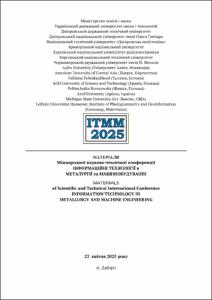Please use this identifier to cite or link to this item:
http://elar.tsatu.edu.ua/handle/123456789/19349Full metadata record
| DC Field | Value | Language |
|---|---|---|
| dc.contributor.author | Lubko, Dmytro | - |
| dc.contributor.author | Лубко, Дмитро Вікторович | - |
| dc.date.accessioned | 2025-06-26T11:30:56Z | - |
| dc.date.available | 2025-06-26T11:30:56Z | - |
| dc.date.issued | 2025 | - |
| dc.identifier.citation | Lubko D. V. Development of a methodology for designing a simulation model of a grain collection and transportation complex // Інформаційні технології в металургії та машинобудуванні – ІТММ 2025: матеріали Міжнародної наук.-технічної конференції (Дніпро, 23 квітня 2025 р.). Дніпро, 2025. С. 293-297. DOI: 10.34185/1991-7848.itmm.2025.01.052 | uk |
| dc.identifier.uri | http://elar.tsatu.edu.ua/handle/123456789/19349 | - |
| dc.description.abstract | EN: The relevance of the topic of the work is determined by the fact that the use of simulation modeling allows you to assess the efficiency of the collection and transport complex, identify its bottlenecks, reduce costs and increase productivity [1]. In agricultural production, the most widespread are systems of mass service with waiting. These are systems in which the request received at a given time (all service channels are busy) is queued and waits until the channel is free. Thus, a combine with a full hopper does not leave the system and waits for the next vehicle to unload grain. If a request received in the system (stopping a combine with a full hopper), finds all the vehicles busy loading other combines, it is forced to wait its turn until one of the vehicles is free. After servicing (unloading the hopper), the combines are again serviced after some time. /// UA: Актуальність теми роботи визначається тим, що використання імітаційного моделювання дозволяє оцінити ефективність роботи збиральнотранспортного комплексу, визначити вузькі його місця, зменшити витрати та підвищити продуктивність. У сільськогосподарському виробництві найбільшого поширення набули системи масового обслуговування з очікуванням. Це такі системи, в яких заявка, що надійшла в момент часу (всі канали обслуговування зайняті), стає в чергу і чекає, поки не звільниться канал. Так, комбайн з наповненим бункером не залишає систему і чекає на черговий автомобіль для вивантаження зерна. Вимога, що надійшла в систему (зупинка комбайна з повним бункером), якщо застає все автомобілі зайнятими завантаженням інших комбайнів, змушене чекати своєї черги до тих пір, поки не звільниться один з автомобілів. Після обслуговування (розвантаження бункера) комбайни через деякий час знову стають на обслуговування. | uk |
| dc.language.iso | en | uk |
| dc.subject | grain harvesting and transport complex | uk |
| dc.subject | work flow chart | uk |
| dc.subject | GPSS | uk |
| dc.subject | simulation model | uk |
| dc.subject | design | uk |
| dc.subject | зерновий збирально-транспортний комплекс | uk |
| dc.subject | блок-схема роботи | uk |
| dc.subject | імітаційна модель | uk |
| dc.subject | проектування | uk |
| dc.title | Development of a methodology for designing a simulation model of a grain collection and transportation complex | uk |
| dc.title.alternative | Розробка методології проектування імітаційної моделі зернового збирально-транспортного комплексу | uk |
| dc.type | Article | uk |
| local.identifier.doi | 10.34185/1991-7848.itmm.2025.01.052 | uk |
| Appears in Collections: | Кафедра Комп'ютерні науки | |
Files in This Item:
| File | Description | Size | Format | |
|---|---|---|---|---|
| Lubko_ITMM_2025.pdf | 601 kB | Adobe PDF |  View/Open |
Show simple item record
CORE Recommender
???jsp.display-item.check???
Items in DSpace are protected by copyright, with all rights reserved, unless otherwise indicated.
